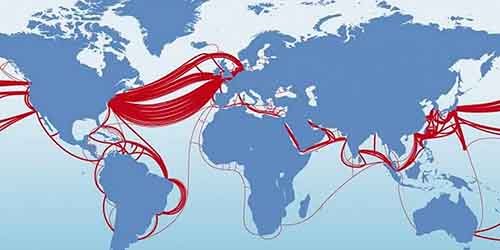A lack of competition and aging submarine cables are key factors driving the high cost of internet in the Caribbean Netherlands. This conclusion comes from a study, the findings of which were recently shared by Minister of Economic Affairs Dirk Beljaarts with the Second Chamber.

The minister plans to discuss potential solutions with island governments, local telecom providers, and the European Commission to deliver better quality and more affordable internet to the BES islands (Bonaire, St. Eustatius, and Saba).
Submarine Cable Research in the Caribbean
Fixed internet costs in the Caribbean Netherlands are significantly higher compared to other Caribbean regions. To mitigate these costs, the central government has been offering subsidies to both consumers and businesses, with plans to continue this support until at least 2026. One of the main cost drivers is the expense of data transport via submarine cables that connect the islands to mainland internet exchanges and data centers. These so-called IP transit costs form a substantial part of the total internet cost on the islands.
The government recently commissioned research to explore the current state of submarine cables in the Caribbean Netherlands and investigate potential alternative routes for the data transit (IP transit). The goal was to identify structural solutions to improve the price-to-quality ratio of internet services. The investigation, completed in August 2024, highlighted several key points:
- Aging infrastructure: Approximately 45% of the submarine cables across the Caribbean are over 20 years old, with the cables around Bonaire nearing the end of their original 25-year lifespan.
- Limited competition: One dominant supplier controls a significant share of the submarine cable market in the Caribbean, limiting competition in both price and service quality. This monopoly affects Bonaire directly, and potentially Saba and St. Eustatius as well.
- Routing limitations: Currently, all IP transit from the BES islands to Europe must pass through the United States. There is no direct or southern route connecting these islands to European data centers.
- Lack of local data storage: Saba and St. Eustatius do not have local data caching points. These caching points allow internet service providers like Netflix or NPO to store frequently accessed data locally, reducing the need for long-distance data transmission. The absence of these points increases both data transit costs and latency for users on these islands.
Next Steps
The study assessed alternative routes but did not comprehensively address all relevant factors, such as geopolitical considerations. The findings and potential alternatives will now be discussed with stakeholders, including island governments, telecom providers, national authorities, and the European Commission. The aim is to address the root causes of high internet prices and develop long-term solutions that offer a better price-to-quality ratio for the Caribbean Netherlands.
 Saba News News and Information from Saba Island, Dutch Caribbean
Saba News News and Information from Saba Island, Dutch Caribbean

Why then all that pride about glass-fibre cables on Saba?
Here is a crazy thought. License STARLINK! No subsidy needed, $80 for quality Internet… Let the local companies resell the equipment, do installations and process payments. They still make their money and keep staff, but the rest of us win with better internet.
If only there was a satellite provider that provided high speed worldwide internet to remote places at an affordable cost….oh thats right…there is….Perhaps Approve Starlink for use in Saba!
I recall, Saba announced with pride about installing more fiber. Then the Dutch government denied Sabans the use of airwaves and satellites providers, like Starlink.
Now, an article about the expense of fiber.
Is this just preparatory news to soften the blow of how much that fiber project will be costing the people?
Air is free. Fiber is not.